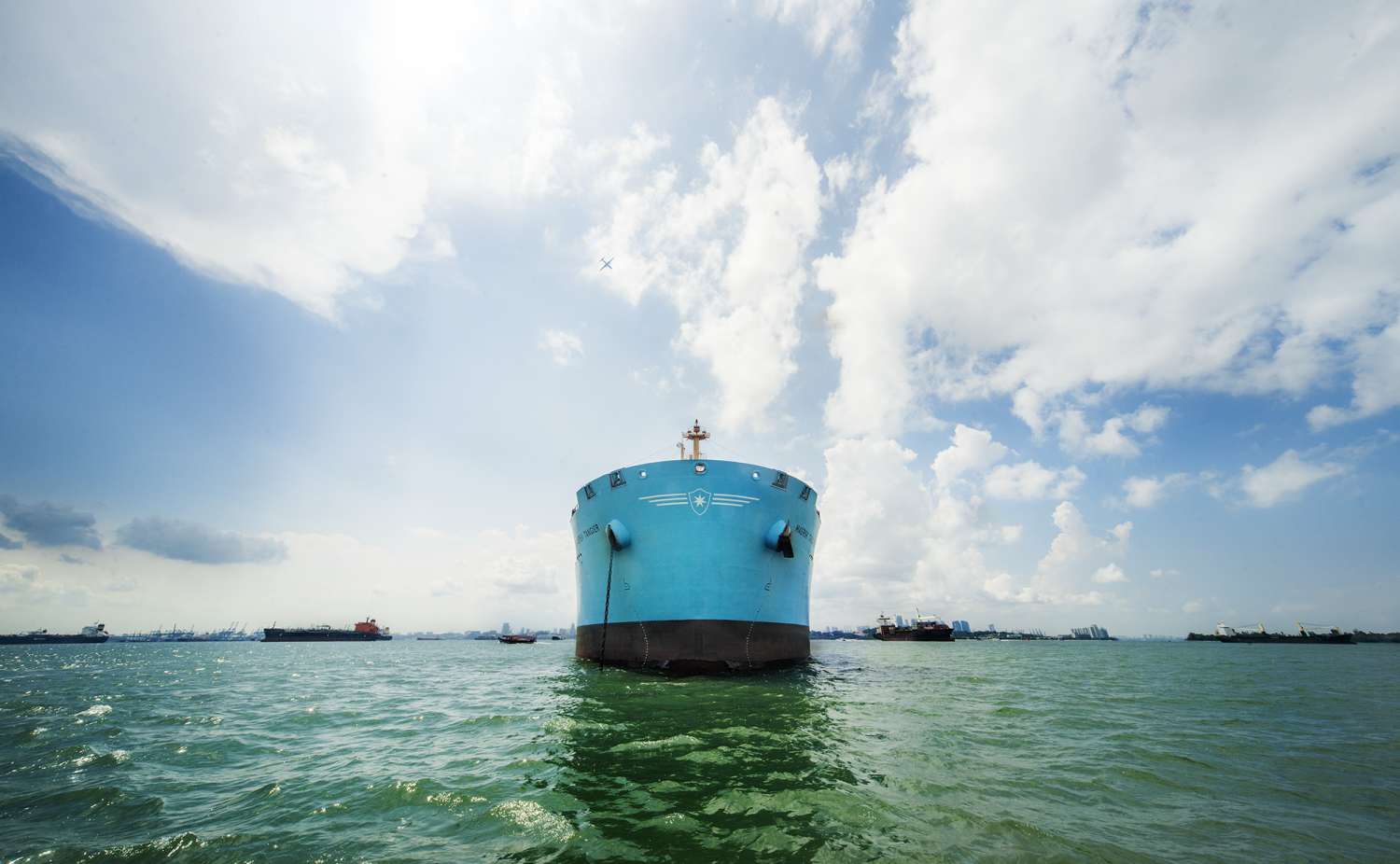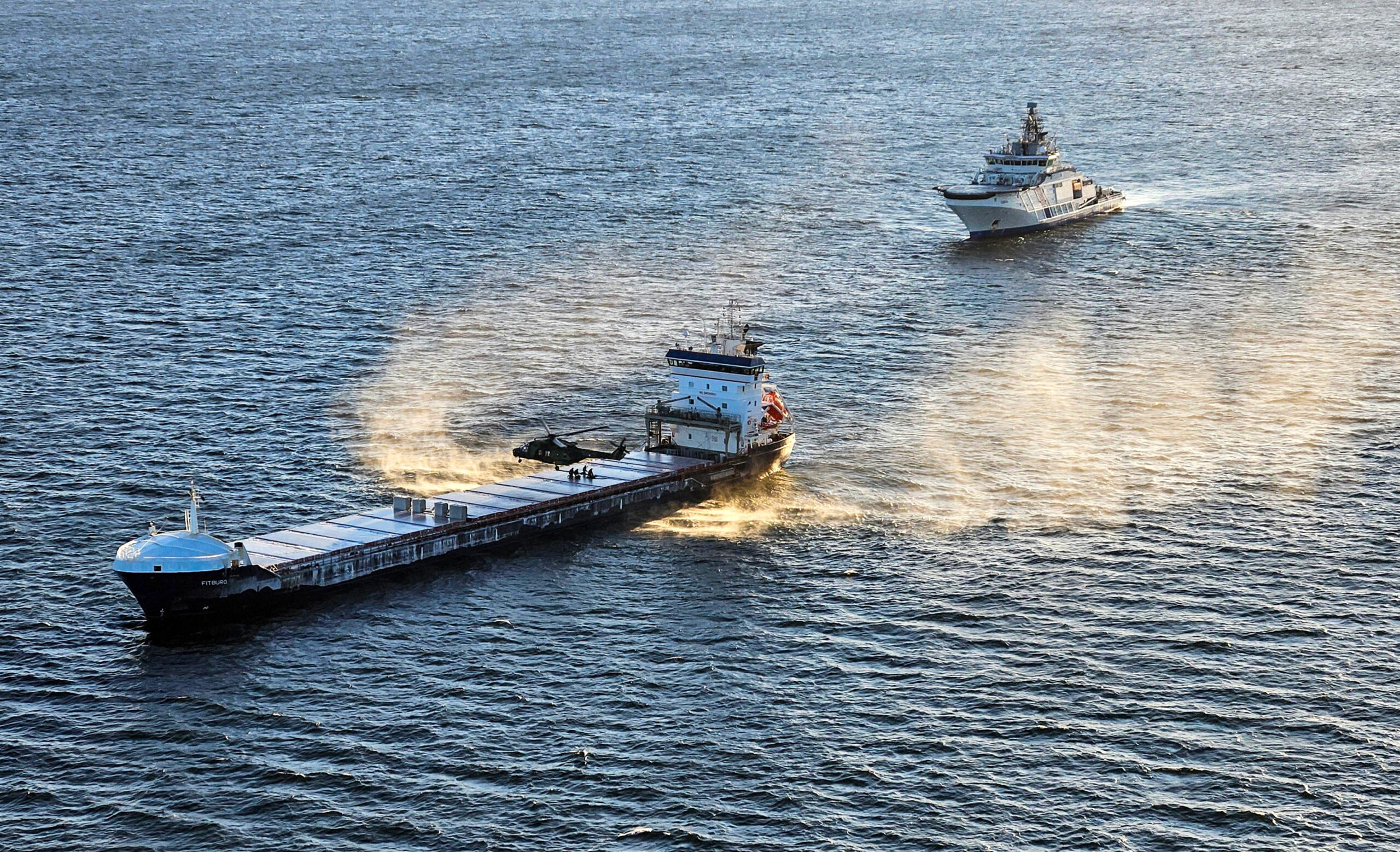by Captain John Konrad (gCaptain) In a world where the Pacific is becoming a cauldron of geopolitical tensions and Russia’s actions in Ukraine highlight the paramount importance of military logistics, the strategic chessboard is experiencing moves that are unparalleled. Maersk, the Danish maritime behemoth and a principal commercial transportation partner for the U.S. military, has chosen to divest its U.S. flagged tanker fleet along with select U.S. military contracts to Maritime Partners, a relatively minor entity operating under the Jones Act. Concurrently, the company is escalating its investments gloablly including in China, prompting speculations into whether these developments are interconnected. The answer is not so simple.
Maersk’s journey with U.S. flagged ships got a boost with the acquisition of SeaLand in 1999, a company established by the pioneer of containerization, Malcom McLean. This acquisition merged SeaLand with Maersk Lines Limited, a U.S.-based subsidiary managing both the fleet and military contracts. Maersk’s commitment to supporting its U.S.-flagged fleet has until recently, been unwavering, offering thousands of union jobs to U.S. Merchant Mariners over the years including the crew aboard Captain Philip’s ill-fated ship Maersk Alabama.
However, with rising geopolitical tensions and the US government’s renewed focus on maritime policy, the US Maritime Administration (MARAD) is emerging from decades of neglect with few additional resources to manage relationships. This is evident in the stark contrast between MARAD, which has only 800 staff members, and its sister agency, the Federal Aviation Administration, which employs 45,000 people. As a result, the US Government – including MARAD, the Biden administration and Congress – is now facing a complex set of challenges that are hindering companies like Maersk from strengthening America’s maritime industry. An industry is increasingly important for a military facing severe logistical challenges in the Black and South China Seas.
When asked about investments in China vs the United states Ed Hanley, Vice President Maersk Line Limited, said the company has been expanding strategically to better serve the North American market. In 2020, Maersk acquired Performance Team to strengthen its presence. In 2021, it acquired Visible Supply Chain Management to enhance its supply chain capabilities. In 2022, Maersk incorporated Pilot Freight Services into its portfolio.
According to Hanley, Maersk executive interviewed by gCaptain today, the company plans to maintain its support and investment in container services and the US Maritime Security Program. However, it has already divested its critical tanker fleet and contracts to manage military grey hull ships. Maersk also was clear the recent divestiture of sale of assets received the approval of key military stakeholders including the US Maritime Administration (MARAD), Military Sealift Command (MSC) and the US Transportation Command (TRANSCOM).
How critical are those assets to the US Military? Very.
“The Department of Defense is projected to need on the order of one hundred tankers of various sizes in the event of a serious conflict in the Pacific,” said former Maersk executive Steve Carmel in a gCaptain editorial. “Not only does the U.S. lack the tonnage required to support a major conflict in the Pacific, it has no identifiable roadmap to obtain it.”
Also Read: The US Navy Needs Tankers: A Crisis In Capability
Shipbuilding The China Dilemma
While it may be easy to blame Maersk for favoring China over American maritime investments, the US government has put commercial allies in a difficult position. On the shipbuilding side, China has poured billions of dollars into shipyards as subsidies, prioritized commercial contracts, and lowered administrative hurdles. In contrast, the United States has not even completed the basic shipyard survey needed for bankers to approve loans since 2004. Shipyards have received very few subsidies, and loan programs like Title XI Federal Ship Financing Program are bureaucratically cumbersome and underfunded. Additionally, the US Navy has occupied most of the shipyard capacity pushing out commercial companies. As a result, it has become exceedingly expensive and difficult for all but a few domestic companies to build new ships in America.
Shipbuilding and ownership structures have a crucial role in the preferential treatment given to Jones Act carriers in various US Military contracts and government programs. This is exemplified in the recent allocations of the Tanker Security Program contracts. While US-based Jones-Act companies Overseas Shipping Group, Crowley, and Seabulk each secured three contracts to supply tankers to the US fleet, Maersk surprisingly received only one.
One executive at a Maersk competitor stated, “MARAD is increasingly favoring relatively small businesses and Jones Act carriers.” However, he also noted that Crowley and Seabulk are collaborating with each other and foreign shipping entities, such as Stena and Torm, to form partnerships for military contracts.
The Tanker Security Program serves as an example of how government initiatives can create challenges for major allied shipping corporations like Maersk, hindering their ability to compete effectively. Another recent example involves Rear Admiral Ann Phillips praising the construction of the first new National Security Multi-Mission Vessel. This ship, built at Philly Shipyard, was the result of a commercial outsourcing contract that involved importing equipment and receiving substantial assistance from South Korean firms. According to Phillips the collaboration saved hundreds of millions of dollars and avoided numerous delays. However, in stark contrast to this achievement, U.S. Senator Tammy Baldwin was simultaneously advocating for new legislation that would counter these cost savings. Her proposed bill aims to prohibit U.S. shipyards from adopting collaborative models that include foreign parts, potentially hindering the replication of Philly’s success in the future.
Shipbuilding matters because without new American-made ships, it’s difficult for companies like Maersk to qualify as Jones Act carriers. Without US and European support for shipyards in other countries like South Korea and Japan, it’s financially unfeasible for any large shipping company – even those who don’t do business with the US Military – to build outside the low government-subsidized yards in China. And even if Maersk built ships in the United States, it’s Maersk can never qualify as a Jones Act carrier due to its foreign ownership structure.
It’s Complicated
This article is challenging to write due to the complexities of government contracts, the flow of capital into government-supported maritime projects in China, and the rapidly changing geopolitical landscape. These three topics are complex individually but become even more intertwined when it comes to meeting the transportation needs of the US Military. However, the main issue is that US Marine Management (USMMI) Maersk’s tanker security and government contracting division appears to have found itself caught between the global competitive demands of its parent company and a complex web of US Government regulations – specifically US procurement policies favoring Jones Act and small businesses – making it difficult to operate effectively.
Under New Ownership
The new owners – the relatively young and small Jone Act Maritime Partners – do not have the global reach, influence or deep pockets of Maersk but that makes them free of many entanglements imposed by Jones Act regulations and geopolitics. They are now free to navigate the confused seas of contracts and international relationships without the burden of being attached to large non-Jones Act companies like Maersk.
“This development is good for us,” said Captain Steve Carmel, a former executive at Maersk, who is now spearheading this newly formed entity. “Maersk had reservations about further investments in both military and tanker endeavors, yet recognized the significance of the mission. Consequently, they found a new owner capable of investing in our mission, enabling us to expand our tanker operations to meet the demands of the U.S. Military.”
Captain Carmel further said that Maersk remains supportive of his initiatives, which encompass strategic backing from Maersk tankers. “I maintain full confidence that Maersk will extend their assistance as and when necessary,” he affirmed.
Questions Remain
Two questions remain. First, if war breaks out and these tankers are asked to respind, will Maritime Partners be able to provide the full support of a giant global company like Maersk?
The second question is will the administration meet with allied shipbuilders and large shipping companies like Maersk to find mutually beneficial arrangements? Or will they leave contracting to the understaffed US Maritime Administration while issuing statements like the one Biden made about the shipping companies in June of last year “Every once in a while, something you learn makes you viscerally angry. Like, if you had the person in front of you, you’d want to pop them”
Can all sides find mutually beneficial ways for allies, the US Merchant Marine, and us shipping interests to benefit or will Jones Act arguments and government contracting restrictions continue to intensify as more large commercial partners find it increasingly difficult to support US military efforts?

 Join The Club
Join The Club











